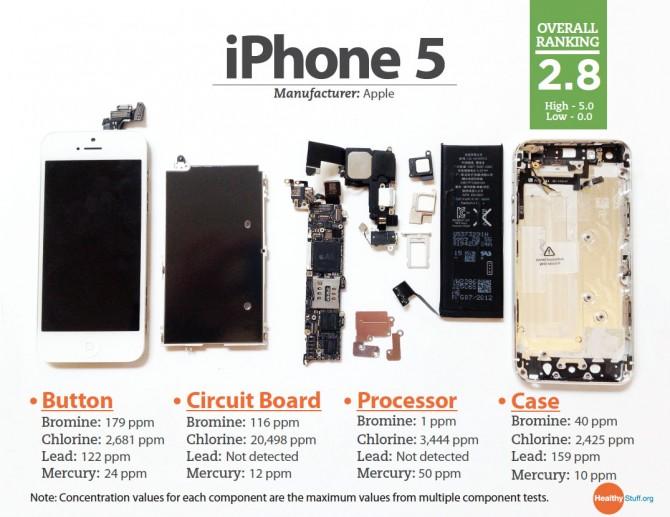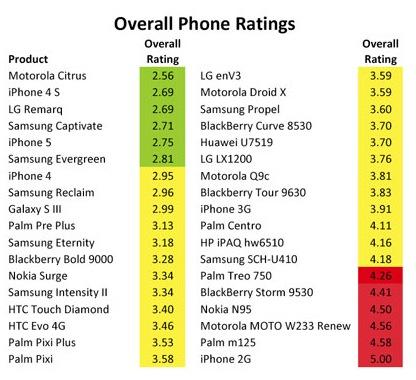iFixit and HealthyStuff teamed up to analyze the level of toxic chemicals found in 36 mobile phones, and found modern handsets to contain fewer harmful chemicals than their predecessors with Apple's iPhone 4S and new iPhone 5 among the least toxic.
The study published by iFixit on Wednesday was based on a chemical analysis study performed by HealthyStuff.org, which sought to discover what hazardous chemicals are found in popular smartphones.
Researchers performed an X-ray fluorescence spectrometric analysis of 36 devices, assigning each a rating on a scale of 0 to 5, lowest being best, and ranked the products by chemical, component and "overall." The process consisted of chemical analysis testing for 12 common hazardous chemicals, such as bromine, mercury, and lead; component testing constituted a breakdown by case, screen, solder, circuit board and other vital parts; and finally an overall assessment of each device.
While Apple's iPhone 2G came in with the worst score, maxing out the ratings scale at 5.0, the newer iPhone 4S and iPhone 5 handsets were found to be of "low concern," at 2.69 and 2.75, respectively. Also deemed environmentally responsible were the LG Remarq, Motorola Citrus, and Samsung's Captivate and Evergreen. Overall, the Citrus contained the least toxic chemicals, and was awarded a score of 2.56.
Sitting at the other end of the spectrum was the Nokia N95, Motorola W233 Renew and Palm m125, each retaining a score of 4.5 or below.
Out of the 36 tested units, 6 were of "low concern," 24 were of "medium concern" and 6 scored poor "high concern" ratings.
Looking at the rankings, a definite improvement from manufacturers can be seen as the poor-performing handsets are mainly older models like the iPhone 2G and Samsung's SCH-U410 from 2007.
It should be noted, however, that phones which scored high ratings overall weren't top performers in every category.
"The 'low concern' Samsung Reclaim had a 'high concern' proportion of arsenic," iFixit writes. "Twenty-four of the phones (nearly 70%) had a 'high concern' proportion of copper."
Major cellphone manufacturers, while making strides, shouldn't "rest on their laurels," the report said, as "many toxics remain" in discarded handsets.
"There is a trend of less toxics overtime, it looks like—especially for Apple. That’s good, but it’s not good enough."
 Mikey Campbell
Mikey Campbell


-m.jpg)






 Marko Zivkovic
Marko Zivkovic
 Mike Wuerthele
Mike Wuerthele
 Christine McKee
Christine McKee
 Amber Neely
Amber Neely
 Wesley Hilliard
Wesley Hilliard

 William Gallagher
William Gallagher










6 Comments
Can't wait to see what GreenPeace has to say about this
Can't wait to see what GreenPeace has to say about this
Apple is a well known brand, and in the news a lot. While they are dong better than their competitors, they of course are not doing enough, and shouldbe setting an even better example for everyone else. We should boycott iPhones until they are made out of 100% wood.
Can't wait to see what GreenPeace has to say about this
GreenPeace will say nothing at all.
Bad news about Apple is all that sells.
[quote name="Rayz" url="/t/153085/apple-iphone-5-4s-among-most-environmentally-friendly-phones-study-finds#post_2203819"]GreenPeace will say nothing at all. Bad news about Apple is all that sells. [/quote] Very true. It's irritating though that they can ding Apple for bullisht when they're doing more for the environment than any other tech company out there but yet remain silent when there is great news like this. I realize that Greenpeace is for the most part irrelevant but it would be nice to see them acknowledge the great works on the environmemtal front that Apple does ONCE in a while.
I agree with all. And I don't understand why iFixIt does this sort of breakdown instead of / earlier than, Greenpeace. Nice to see Palm gets some 'news' again¡